The 15 Best Jackie Chan Movies Ranked
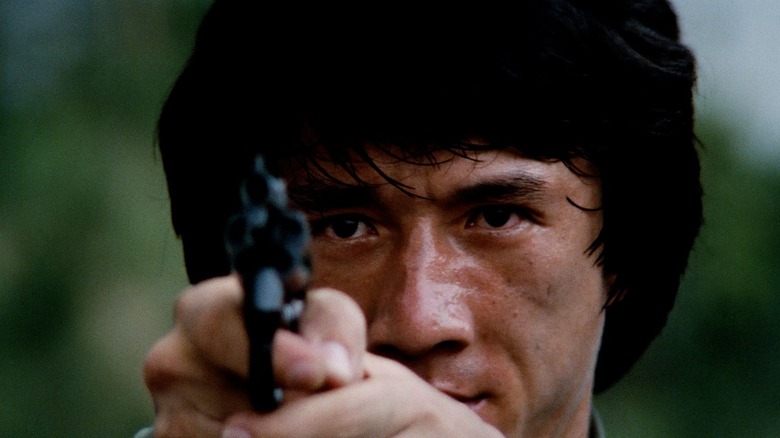
Any conversation about action cinema has to include the name Jackie Chan. It's a legal requirement. He's far from the only action star, but his accomplishments and influence on the genre are undeniable. While Chan's earliest films saw producers trying to make him into the next Bruce Lee, Chan found his own footing in the late '70s by blending creative choreography with humor. He's never looked back. From one of the best fight scenes of all time in "Wheels on Meals" (1984) to the epic stunts in "Armour of God II: Operation Condor" (1991) to blockbuster Hollywood efforts like "Rush Hour" (1998), Chan is the action star.
Chan's heyday ran from the late '70s through the late '90s, and fans would be hard-pressed to find a Chan film during that time that doesn't deliver the goods. Picking the best can be difficult, and not only because a list of Chan's best fight scenes would undoubtedly include different choices. One quick note: I'm only considering films with Chan in a lead role, as otherwise the list would just be "Enter the Dragon" (1973) 14 times, then "Attack of the Kung Fu Girls" (1973) at number one (I kid).
The Foreigner (2017)
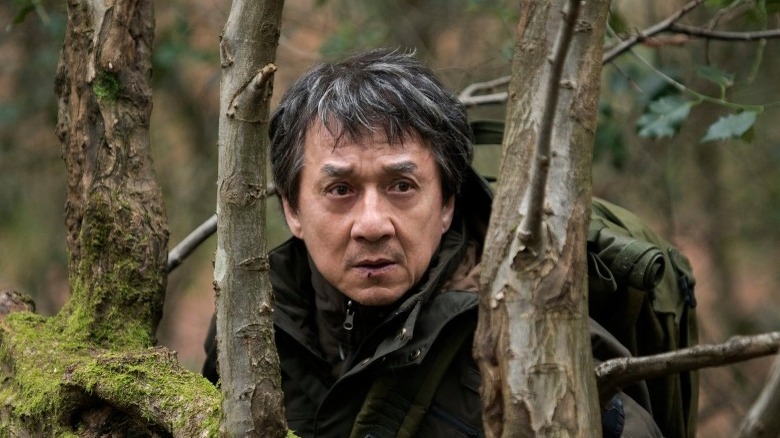
Did I say that Chan's best years ended before the new millennium began and then opened this list with a movie from 2017? Yes, I did. "The Foreigner" is late-career Chan and a bit light on the action, but it still belongs here. Chan plays an immigrant who left a shady past behind him to raise his daughter, only for those past skills to come roaring back when she dies in a terrorist attack and Chan seeks revenge. Pierce Brosnan stars as a politician and former IRA member, and while his motivations play fast and loose, Chan's character is driving hard towards those responsible.
Martin Campbell, a director whose own career features more than a few action gems, balances plot, character, and action to deliver a thrilling tale with an emotional punch. Chan gives one of his best dramatic performances as a dour man fueled by rage and capable of unleashing hell, and while the story precludes big, fun set-pieces, the action is all the more satisfying for it. Cathartic violence is the best violence, and when scored by Cliff Martinez, it's music to your action-loving heart.
Snake In The Eagle's Shadow (1978)
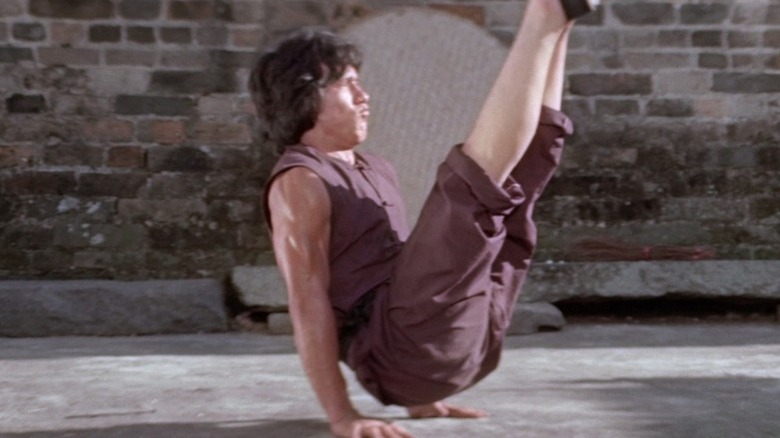
The oldest film on this list, "Snake in the Eagle's Shadow" earns its spot for numerous reasons. Sure, its story is generic -- a young man is berated and beaten until serious training makes him a fighting master -- but it's nonetheless a groundbreaking feature. Not only is it the directorial debut of Yuen Woo-ping, a legend who would go on to choreograph fights in multiple Hong Kong efforts as well as "The Matrix" (1999) and "Kill Bill" (2003), but it's also the first time that Chan stopped trying to be something he's not and instead cut loose with his own style and personality.
Alternately silly and cruel, the barebones story is merely a framework on which to hang a showcase for both Yuen's choreography and Chan's physicality. The result is a seemingly effortless display of control and precision as Chan's style grows to incorporate literal effects and motions from animals (to that point, stick with the international versions, as they trim a nasty little brawl between a cobra and a house cat). The action highlight, though, might just be a comedic sequence in which Chan tries to keep a floor clean.
Mr. Nice Guy (1997)
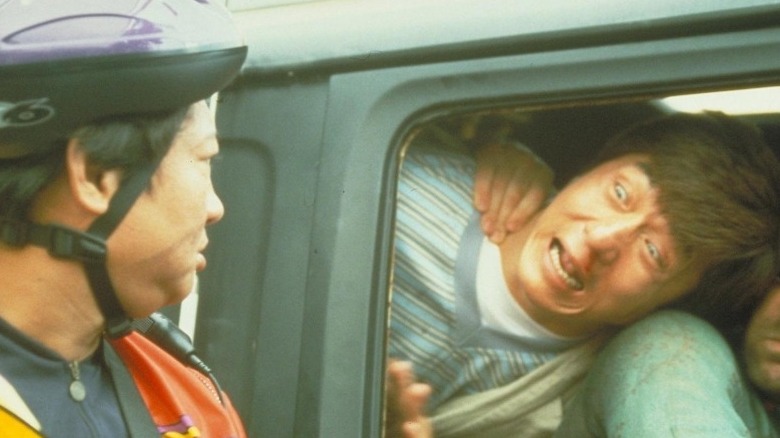
Along with 1998's "Who Am I?" Sammo Hung's "Mr. Nice Guy" arguably marks the end of Chan's run of guaranteed good times. It was originally planned as the fifth "Police Story," and the direct-through line from "Police Story 4: First Strike" (1996) is evident in the Australian locales and English-language script. Chan plays a celebrity chef who gets mixed up with mob shenanigans after the criminals come to believe that evidence of their foul play has landed in his possession. They go after the chef and his friends, and Chan makes a meal out of them.
The inclusion of "Who Am I?" will lead some to doubt my sincerity, but it's an entertaining blend of casual thrills, silliness, and the occasional mean-spirited villain. Richard Norton plays the big bad, making this a reunion for the two after co-starring together in Chan's manga-inspired "City Hunter" (1993), and he's both a great fighter and a wonderful ham of an actor. It all builds to an explosive finale, but just getting there involves some thrilling setpieces, including a chaotic construction-site brawl.
The Young Master (1980)
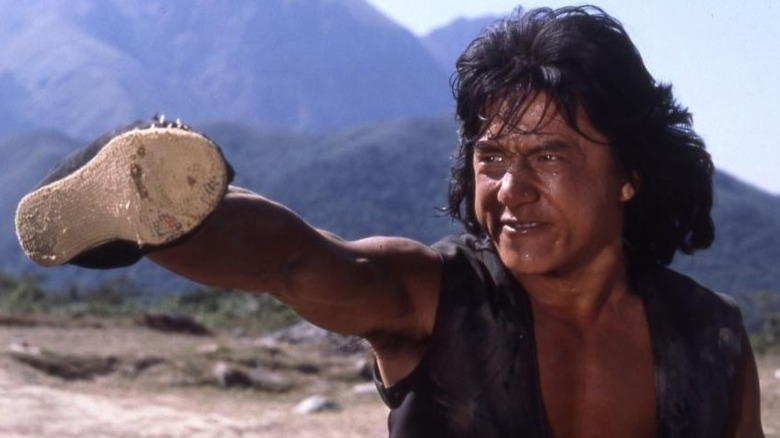
After making his directorial debut the year before with "The Fearless Hyena" (1979), Chan returned with a visibly improved grasp on pacing, character, and fight direction. "The Young Master" sees Chan's character searching for his brother and being mistaken for an escaped criminal along the way. He's forced into multiple fights, but he has no need of training -- he only requires motivation. Bad guys are happy to oblige, leading to a series of setpieces that, despite the occasional comic dressing, are deadly serious affairs.
There are small highlights throughout, but the film's highest peaks come in the form of its bookends. The movie opens with a beautifully designed dance that sees multiple performers move a dragon-like paper lion through meticulous movements -- part dance, part competition, all masterfully executed -- while the ending is the big fight audiences are expecting. It unfolds atop a hill with landscapes in all directions, and it goes on for 15 minutes or so. It's Chan versus Hwang In-shik, and our hero gets his ass handed to him repeatedly until a last-minute swig of bong water pisses him off and makes him unbeatable.
Police Story IV: First Strike (1996)

The "Police Story" continuity starts to wobble here, meaning no more Maggie Cheung, but "First Strike" is still a ton of sun-drenched fun. Chan's Hong Kong cop finds himself inexplicably enmeshed with America's CIA and sent on a mission to Ukraine before being shipped off to Australia (by way of a Russian submarine). That's right, Stanley Tong is once again in the director's chair! That's not a knock, as the bigger action beats entertain and the overall silliness never gets in the way of the thrills.
Chan's trademark fight genius remains on full display throughout. From the early snowbound brawls to an underwater fight interrupted by a hungry (and laughable) shark, the film delivers plenty we haven't seen from Chan before. The highlight has him interrupt a memorial hoping only to talk, but the targets don't listen and attack instead, leading to a terrific fight in which Chan makes brilliant use of a ladder. As with "Supercop," "Police Story IV" does away with the seriousness of the first two franchise entries, resulting in stress-free entertainment.
Crime Story (1993)
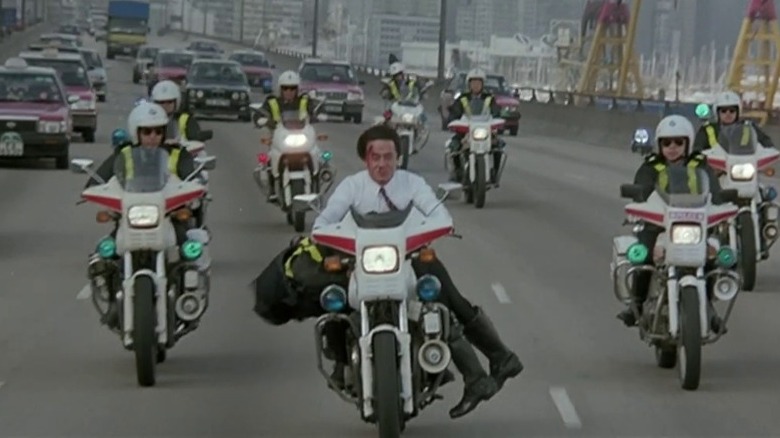
Chan's filmography consists mostly of fun-loving guys who kick butt, but he's dabbled in more serious roles, too. "Crime Story" is one such example. It almost plays like a laugh-free "Police Story" film. Chan is a cop, a rule-breaker, and he's targeted some cruel bastards for violent justice, but where he'd normally make time for relationship hijinks and playful action beats, this time it's all business. Some fans won't follow him down this road, but Chan more than holds his own as an actor while still delivering terrific action sequences, including a beautifully shot fight amid bamboo rafters and flowing draperies.
The film is based on the real-life kidnapping of a Chinese executive, and Chan plays a cop determined to see the case through to its conclusion. Gun fights, minor scraps, and some intense car action follow, but the drama is heavy here. That will strike some as odd, but it works. Chan's cop is suffering mentally from the carnage, and it lends the film a more emotional tone than Hong Kong action movies typically aim for. Director Kirk Wong crafts a legitimately dramatic thriller, and I promise it's worth your time.
Police Story 2 (1988)
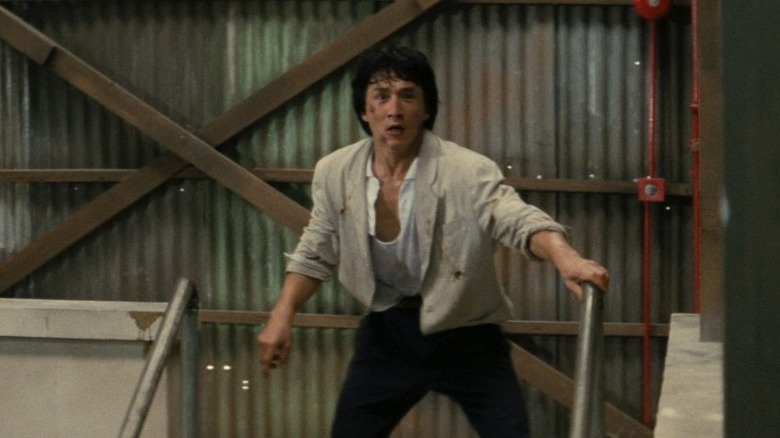
"Police Story 2" makes a direct effort to pick up the story and character threads from the first. Chan's character is still having romantic squabbles with his girlfriend (Maggie Cheung), and while he's targeted by the first film's villains there's also a new threat involving a series of bombings. The second act mostly eschews action beats for character work and plot -- it adds some minor bloat and accounts for the film's apparently lesser standing -- but it works and finds some laughs. And when the action hits, it's killer.
An early restaurant fight and a blistering playground throwdown whet the appetite for what's to come, after some lowlifes abduct Chan's lady and force him to unleash hell. The fireworks explode, quite literally, in a fireworks factory. We get a full 10 minutes of Chan facing off against multiple bad guys, and the action features fights, big stunts, and a gag that left Cheung with scalp stitches. It all leads to a fiery finale as fireworks, explosives, neon lights, and more leave everything ablaze.
Drunken Master (1978)
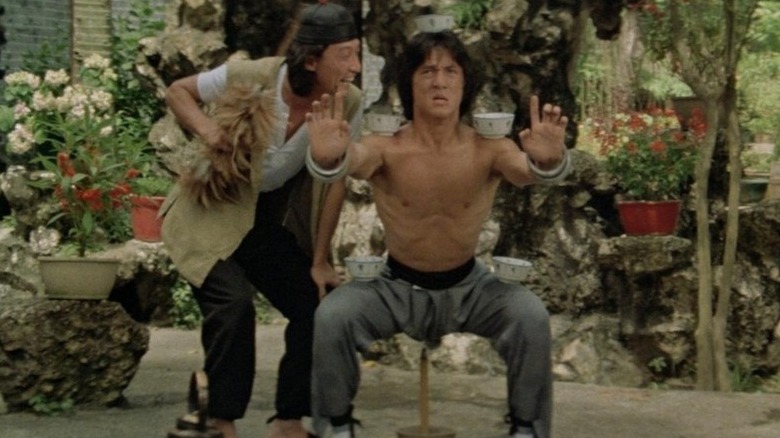
Made and released just seven months after "Snake in the Eagle's Shadow," "Drunken Master" reunites Chan with director Yuen Woo-ping for another groundbreaking classic. The action once more comes fast and furious as Chan finds himself caught up in all manner of conflicts. He loses a few early on, including one against his aunt and another against a villain known for his "Devil's Kick," but after some grueling and visibly painful training he returns to defeat the bad guy.
The groundbreaking aspect comes in the film's portrayal of the much revered and frequently adapted character of Wong Fei-hung. More than a hundred films have been made featuring the real-life physician-slash-martial artist, but Chan was the first to really poke fun at the character. Chan's portrayal gives viewers a playful, crass, and at times belligerent Wong, and it works to the film's benefit as it offers both a unique personality and arc.
Mr. Canton And Lady Rose (1989)
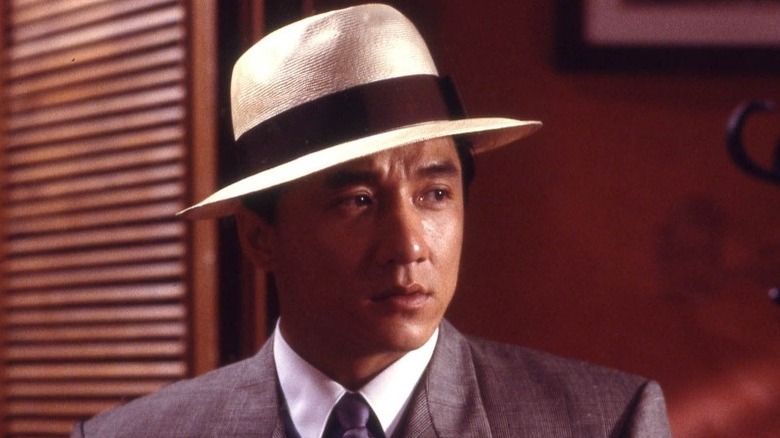
Action isn't quite the focus of "Mr. Canton and Lady Rose," but don't let that scare you away. The film is available under numerous titles, including "Miracles," "Black Dragon," and "The Canton Godfather," but whichever version you find is a guaranteed treat. A loose remake of Frank Capra's "Pocketful of Miracles" (1961), the film sees Chan as a young man whose luck picks up after buying a rose from an old woman. That connection leads directly to him becoming a big boss with a gang of thugs beneath him, but his efforts to take their shenanigans straight leads to conflict and hijinks.
While comedy, romance, and kindness are the main threads, the film makes time for spectacular action too. Smaller fights and sequences show Chan's nimble and never less than impressive acrobatic skills, but a third-act fight in a rope factory is an all-timer, featuring beautiful beatdowns and brawls. Chan's direction is on-point during the big finish, but it's arguably even more eye-opening throughout as he captures 1930's Hong Kong with memorable period visuals, fluid camerawork, and pitch-perfect production design. And did I mention the great Anita Mui as the female lead?
Rumble In The Bronx (1995)

I might catch hell for ranking this one so highly, but "Rumble in the Bronx" is an unapologetically entertaining blast. More movies could stand to deliver so completely on their intentions -- here Chan and director Stanley Tong simply want to have fun while showcasing Chan's extraordinary physical prowess and the beautiful mountain landscapes rising majestically outside of New York City. This was the film that helped introduce Chan into the US mainstream, and it undoubtedly holds a place in my heart for that alone -- but it also has the chaotic and ridiculous action chops to back it all up.
Chan plays a visitor to "NYC" who finds a neighborhood in disarray and overrun by gangs. One group of ruffians tries to mess with him, only to get schooled in the art of using everything within reach as a weapon. The interracial gang is exaggerated in every way, but the comedic styling never gets in the way of the action, which is frequent, fast, and terrifically fun. And that's even before a big hovercraft comes ashore, threatens to run over a child, and finally gets gutted by an extremely creative maneuver.
Dragons Forever (1988)
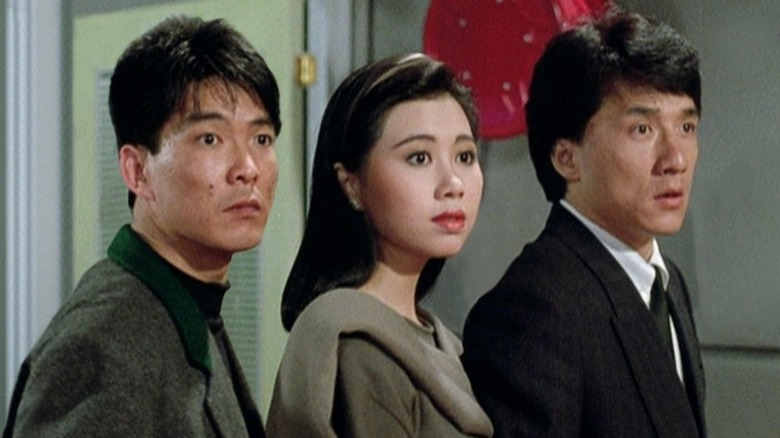
At the risk of sounding blasphemous, the true Holy Trinity consists of Jackie Chan, Sammo Hung, and Yuen Biao. "Dragons Forever" is one of their two greatest triumphs as a filmmaking team, and all three shine as fantastic martial artists with highly entertaining personas. The plot here focuses on a chemical corporation that's up to no good and the three men -- a lawyer, an arms dealer, and a goofy inventor -- who come together to stop them.
All three get to show off their masterful skills alongside some comedy bits, romantic endeavors, and the occasional politically incorrect comment -- it was the '80s! -- creating 90 minutes of entertaining bliss. They fight each other, they fight others, and ultimately they fight Benny "The Jet" Urquidez in a rematch four years after "Wheels on Meals." Amazingly, that fight isn't even the solo highlight here, as it's shared with the cigar-slurping boss, Yuen Wah, who strikes with a precise economy of motion and has mastered staircases better than you ever will.
Police Story III: Supercop (1992)
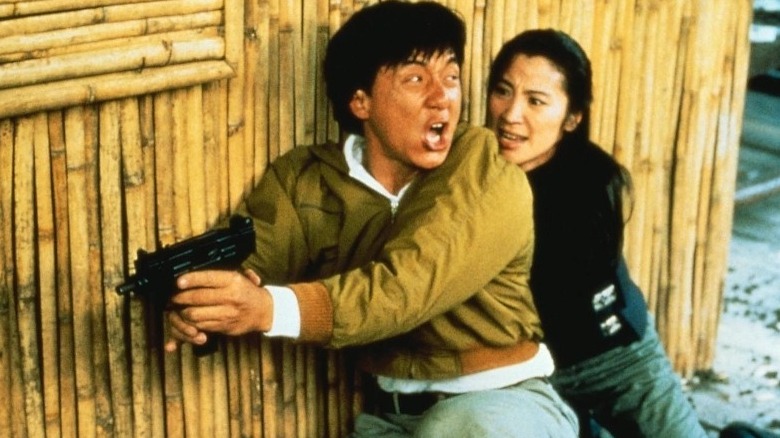
The franchise leaves Hong Kong behind for the mainland, but that's not the only big addition here. After years of women in Chan films existing as props or punchlines, "Supercop" sees Chan finally work up the courage to let one be an absolute badass. Michelle Yeoh joins the mission and proves herself every bit as capable as a fighter and action star. She has the comedic patter down too, and they make for an energetically entertaining duo.
The film offers the expected blend of fights and stunts as the pair go undercover to shut down a drug lord's operation, and it all feels bigger as a result. Chan hands the director's reigns to Stanley Tong, who seems more comfortable with the fiery bombast than the nitty gritty of the fight scenes. It's a trade-off -- some of the fights feel less free in their editing, but the result remains an immensely enjoyable film. The big finale involving moving trains, motorcycles, and helicopters is a standout for all involved, but it's notable in that Chan lets Yeoh's stunt work shine brightest (although that probably explains why they never co-starred again. outside of 2011's "Kung Fu Panda 2"...).
Project A (1983)
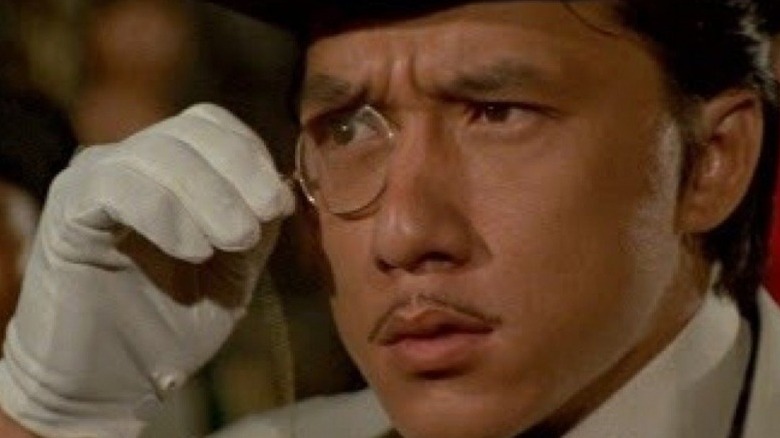
You don't expect to find pirates in your Hong Kong martial arts cinema, but Chan was thinking outside the box with "Project A" and its sequel, "Project A 2" (1987). He plays Dragon Ma, a Coast Guard cadet turned police officer turned rogue hero who finds a corrupt police department working in cahoots with pirates. That won't stand, and along with the always welcome Yuen Biao and Sammo Hung, Ma sets out to take the baddies down. Unlike their beloved "Lucky Stars" trilogy -- films that missed landing on this list due to the trio's minimal presence and an abundance of objectively terrible comedy -- the three talented friends get more to do here.
The film delivers several fights, but it's the setpieces and stunts that stand out. From a Harold Lloyd-like sequence hanging from -- and falling from -- a clocktower to a Buster Keaton-esque bicycle chase, Chan puts himself in elaborate situations that alternate between dangerous and playful. He very nearly breaks his neck at the end of that clocktower fall. "Cutthroat Island" (1995) this ain't.
Drunken Master II (1994)
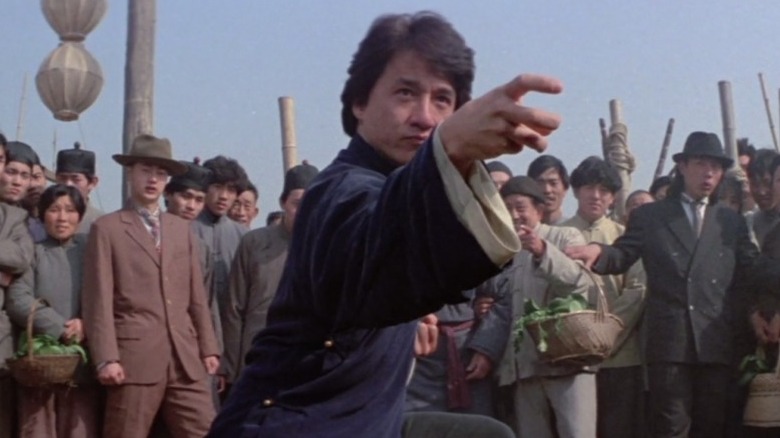
While the bulk of Chan's '80s and '90s efforts are contemporary action films, he returned to the traditional period piece for this sequel to his 1978 classic. "Drunken Master II" sees Chan once more as the playful son to a respected man, and it's his antics that land his family in trouble. The story pits Chan's Wong Fei-hung against British goons who are trying to smuggle Chinese treasures out of the country, and it balances Wong's dual "fights" against both the baddies and his father's ongoing disappointment.
The action is endlessly brilliant, brutal, and impressive with no fewer than three unforgettable setpieces surrounded by smaller bursts of fun. The film opens with Chan facing off against Lau Kar-leung beneath a train and platform, both of which force the pair to fight hunched over in cramped quarters. They team up later for a legendary teahouse fight against dozens of thugs and use every bench, chair, and pole at their disposal. The final fight between Chan and Ken Lo -- a top-five clash on Chan's resume -- sees him burned, beaten, and red in the face as he imbibes rage-inducing alcohol almost to the point of bursting.
Police Story (1985)
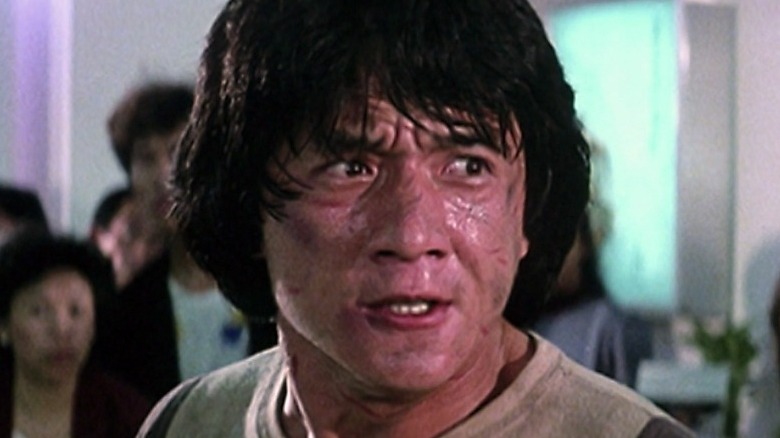
Chan had already shown an interest in accentuating his action with big stunts prior to 1985, but "Police Story" remains the absolute pinnacle of that pairing. The opening shantytown sequence is so epic that not only did Michael Bay rip it off for "Bad Boys II" (1993), but Sylvester Stallone borrowed a beat for "Tango & Cash" (1989) as well. There's more beauty and miracles of the human body in this opening 20 minutes than you'll find in most entire movies. And there's still 80 more minutes to go!
Chan plays a cop pushed to the brink by villains outplaying the legal system, and his efforts to bring them down leads to laughs and wince-inducing violence. A staged home invasion displays incredible comedic choreography and is followed by an even more elaborately constructed car attack. A bit with Chan juggling multiple phone calls is its own slice of perfection, while the finale in a big mall has yet to be matched. Add in Bill Tung, Maggie Cheung, and Brigitte Lin, and you have the best Jackie Chan film in a crowded field.
Read this next: 5 Great Martial Arts Movies To Stream After Shang-Chi And The Legend Of The Ten Rings
The post The 15 Best Jackie Chan Movies Ranked appeared first on /Film.
from /Film https://ift.tt/3n75cVb
No comments: